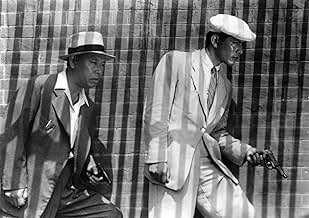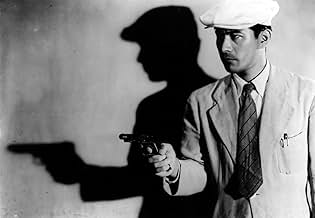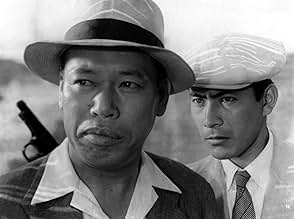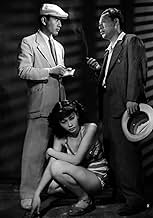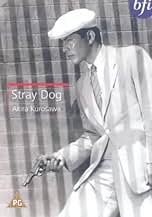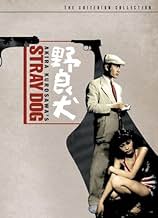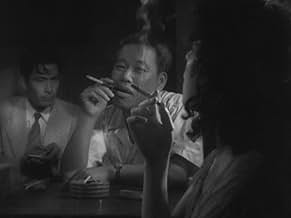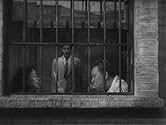AVALIAÇÃO DA IMDb
7,8/10
20 mil
SUA AVALIAÇÃO
Durante um verão escaldante, um detetive de homicídios novato tenta encontrar sua pistola Colt roubada.Durante um verão escaldante, um detetive de homicídios novato tenta encontrar sua pistola Colt roubada.Durante um verão escaldante, um detetive de homicídios novato tenta encontrar sua pistola Colt roubada.
- Direção
- Roteiristas
- Artistas
- Prêmios
- 4 vitórias no total
- Direção
- Roteiristas
- Elenco e equipe completos
- Produção, bilheteria e muito mais no IMDbPro
Avaliações em destaque
In ravished, Post-War Tokyo, rookie Detective Murakami's (Young Toshiro Mifune) gun is stolen. Being the crippling times, guns are tough to come by. Soon, victims are found, slain with bullets from Mifune's gun. The man-hunt is on, while Tokyo goes through a devastating heatwave, and Mifune goes through an equally devastating change ("A Stray Dog sees only what it chases" a detective warns him.) Made well before Akira Kurosawa became famous for "Rashomon", "Stray Dog" is a roaring classic! Every character's movement reflects either the horrid heatwave, or the living conditions. It is ironic that a downpour (Kurosawa's favorite on-screen weather condition) breaks the heat just as the tensions in the film mount. How "Bicycle Thief" reflected the times of post war Italy, this classic does the same for post war Japan.
This early Kurosawa effort floats stylistically somewhere between the film noir and neo-realism, incorporating the best from both worlds to elaborately craft a landscape (both physical and social) of post-war Japan. It's only been 4 years since the dreadful A-bombings and the subsequent defeat of Japan in WW2 and both the country and the people are deeply scarred. War veterans return home to find a country torn by poverty and as the saying goes, desperate conditions demand desperate measures.
A very young Toshiro Mifune plays the greenhorn detective who has his gun stolen and spends the rest of the movie trying to track down the culprit. As it turns out the culprit is a war veteran just like Mifune's character, only where the latter tried to do good and found an honest job, the former opted for the easy way out and became a criminal, using the stolen gun to rob and kill. This adds an additional layer of motivation for detective Sato. Not only does he have to restore his honour (ironically symbolised by the lost gun which he tries to retrieve), but also redeem himself by bringing the killer to justice. What makes matters worse for him is that every time his stolen gun is fired someone dies or gets injured, which adds another burden of guilt on the shoulders of the young detective.
The story might appear too moralistic and convenient (both antagonist and protagonist share a common background, being war veterans, making the distinction of good and bad all too easy), but it has to be seen in the context of the times. Mifune says that there are no bad people, only bad situations. But as his detective collaborator on the case remarks (played by the great Takashi Shimura, who also starred in Seven Samurai) he faced the same bad situation and made something good out of it. Kurosawa here neatly balances the social climate of post-war Japan and the conditions of the times with personal responsibility.
Story-wise it's a worthy effort, but like Rashomon, it sounds a little bit better than it actually is. Not that Stray Dog is a bad movie by any means, but clocking in at 2 hours it starts to drag near the middle. There are some nice set-pieces that showcase Kurosawa's growing talent (like the phone scene in the hotel where he uses inter-cutting to great effect) and the performances are solid all around. There's also a silent 10 minute montage of location footage shot in rundown neighborhoods as Sato searches the black market for his gun, which serves as a poignant snapshot of Japanese history.
Kurosawa would go on to achieve international acclaim with his next movie, Rashomon, but Stray Dog already shows that he was destined for great things. Compared to later entries in his filmography Stray Dog appears to be a minor entry, but it's still well worth the time to discover.
A very young Toshiro Mifune plays the greenhorn detective who has his gun stolen and spends the rest of the movie trying to track down the culprit. As it turns out the culprit is a war veteran just like Mifune's character, only where the latter tried to do good and found an honest job, the former opted for the easy way out and became a criminal, using the stolen gun to rob and kill. This adds an additional layer of motivation for detective Sato. Not only does he have to restore his honour (ironically symbolised by the lost gun which he tries to retrieve), but also redeem himself by bringing the killer to justice. What makes matters worse for him is that every time his stolen gun is fired someone dies or gets injured, which adds another burden of guilt on the shoulders of the young detective.
The story might appear too moralistic and convenient (both antagonist and protagonist share a common background, being war veterans, making the distinction of good and bad all too easy), but it has to be seen in the context of the times. Mifune says that there are no bad people, only bad situations. But as his detective collaborator on the case remarks (played by the great Takashi Shimura, who also starred in Seven Samurai) he faced the same bad situation and made something good out of it. Kurosawa here neatly balances the social climate of post-war Japan and the conditions of the times with personal responsibility.
Story-wise it's a worthy effort, but like Rashomon, it sounds a little bit better than it actually is. Not that Stray Dog is a bad movie by any means, but clocking in at 2 hours it starts to drag near the middle. There are some nice set-pieces that showcase Kurosawa's growing talent (like the phone scene in the hotel where he uses inter-cutting to great effect) and the performances are solid all around. There's also a silent 10 minute montage of location footage shot in rundown neighborhoods as Sato searches the black market for his gun, which serves as a poignant snapshot of Japanese history.
Kurosawa would go on to achieve international acclaim with his next movie, Rashomon, but Stray Dog already shows that he was destined for great things. Compared to later entries in his filmography Stray Dog appears to be a minor entry, but it's still well worth the time to discover.
*-Catch it on TV **-Worth a Rental ***-Buy it Used/On Sale ****-Buy it New/Top Dollar *****-Worthy of a Blind Buy
Until early May of 2004 I was, for lack of a better label, an Akira Kurosawa virgin. I had never had the privilege of watching one of his masterpieces and every time I had the opportunity something got in the way. In May I found myself with a hundred dollars (a small fortune to a high school student with no job) and staring at Kurosawa's Four Samurai Classics dvd collection at Best Buy. The box set included the Criterion editions of Seven Samurai, The Hidden Fortress, Yojimbo, and Sanjuro priced at $82.99. I saw this as a bargain since Criterion edition dvds usually run around $40 a pop, so I bought it without hesitation. After viewing all four films over a weekend I craved more Kurosawa and spent what money I had left on Rashomon, thus beginning my foray into Kurosawa's art.
I have been extremely satisfied with the five Kurosawa films I have seen and was pleased to receive Stray Dog in the mail today from Netflix. I began watching it within about 20 minutes of getting it and from the beginning I was hooked. The film stars Toshiro Mifune as rookie detective Murakami in 1940's Tokyo. Murakami's pistol has been stolen from him while riding a crowded bus on a hot day. Disgraced at himself for having lost such an important item he sets out to find the culprit and enlists the help of veteran detective Sato (played by Takashi Shimura). Together the two detectives hunt down the man responsible. However, things get worse and their investigation intensifies as they learn that the weapon is used in an armed robbery. Sato becomes a mentor to Murakami and takes him under his wing as they get closer and closer to their perpetrator.
Toshiro Mifune's performance is magnificent. He is not the over confident Kikuchiyo from Seven Samurai, or the calm and cool ronin from both Yojimbo and Sanjuro; instead he is a rookie detective in 1940's Tokyo. Mifune portrays a Murakami filled with tension and self-loathing. As his gun is used in more acts of violence, Murakami sinks deeper and deeper emotionally by placing the blame entirely on himself. Takashi Shimura is equally impressive as the veteran Sato. These two actors play very well off of eachother. Their chemistry alone is enough to make you want to see the film, luckily it is not the only reason. Akira Kurosawa tells the story with amazing pacing that seems slow but never boring. The use of forshadowing had little to do with subtilty and added to the tension of the film as the detectives closed in on their suspect until the tense climax, which I will not spoil for you.
All in all Stray Dog was two hours of intelligent storytelling combined by skillful acting. I would be tempted to give it a ***** rating solely because it is Kurosawa, however he gave me enough reasons to do so in the film itself.
Until early May of 2004 I was, for lack of a better label, an Akira Kurosawa virgin. I had never had the privilege of watching one of his masterpieces and every time I had the opportunity something got in the way. In May I found myself with a hundred dollars (a small fortune to a high school student with no job) and staring at Kurosawa's Four Samurai Classics dvd collection at Best Buy. The box set included the Criterion editions of Seven Samurai, The Hidden Fortress, Yojimbo, and Sanjuro priced at $82.99. I saw this as a bargain since Criterion edition dvds usually run around $40 a pop, so I bought it without hesitation. After viewing all four films over a weekend I craved more Kurosawa and spent what money I had left on Rashomon, thus beginning my foray into Kurosawa's art.
I have been extremely satisfied with the five Kurosawa films I have seen and was pleased to receive Stray Dog in the mail today from Netflix. I began watching it within about 20 minutes of getting it and from the beginning I was hooked. The film stars Toshiro Mifune as rookie detective Murakami in 1940's Tokyo. Murakami's pistol has been stolen from him while riding a crowded bus on a hot day. Disgraced at himself for having lost such an important item he sets out to find the culprit and enlists the help of veteran detective Sato (played by Takashi Shimura). Together the two detectives hunt down the man responsible. However, things get worse and their investigation intensifies as they learn that the weapon is used in an armed robbery. Sato becomes a mentor to Murakami and takes him under his wing as they get closer and closer to their perpetrator.
Toshiro Mifune's performance is magnificent. He is not the over confident Kikuchiyo from Seven Samurai, or the calm and cool ronin from both Yojimbo and Sanjuro; instead he is a rookie detective in 1940's Tokyo. Mifune portrays a Murakami filled with tension and self-loathing. As his gun is used in more acts of violence, Murakami sinks deeper and deeper emotionally by placing the blame entirely on himself. Takashi Shimura is equally impressive as the veteran Sato. These two actors play very well off of eachother. Their chemistry alone is enough to make you want to see the film, luckily it is not the only reason. Akira Kurosawa tells the story with amazing pacing that seems slow but never boring. The use of forshadowing had little to do with subtilty and added to the tension of the film as the detectives closed in on their suspect until the tense climax, which I will not spoil for you.
All in all Stray Dog was two hours of intelligent storytelling combined by skillful acting. I would be tempted to give it a ***** rating solely because it is Kurosawa, however he gave me enough reasons to do so in the film itself.
The following year, 1950, would see Kurosawa achieve his first major international success with the masterpiece Rashomon. Here, Kurosawa doesn't quite have the sureness of touch which would characterize most of his career, but Stray Dog is nevertheless a fine film noir and an effective exploration of Kurosawa's ideas about postwar Japan in particular and the human condition in general.
As you might expect from such a genius, Kurosawa is not satisfied with a simple good-guys/bad-guys cops-and-robbers story. He explores in depth the social and economic conditions in postwar Japan which led many young people--particularly returning veterans--to take to crime, and also the particular circumstances which motivate the acts of Yusa (Isao Kimura), the criminal. Indeed, a series of mistakes by the hero, rookie detective Murakami (Toshiro Mifune), are one factor behind Yusa's crimes.
But neither is Stray Dog a facile blame-society message film, either. Kurosawa makes no excuses for Yusa. By giving Murakami a very similar history (so similar, in fact, that it comes off as a little contrived), Kurosawa makes the point that Yusa had the same choice as Murakami. That he chose differently is his responsibility.
But even more interesting to me is the character of chief detective Sato (Takashi Shimura), Murakami's superior officer, mentor, and friend.
Sato is the wise elder figure in this film, and in the hands of a lesser artist than Kurosawa, such a character generally ends up as a mouthpiece for the director's own viewpoint. Here, though, Kurosawa permits Sato to espouse a hardcore law-and-order philosophy: The cops are the good guys, the crooks are the bad guys, and that's it. Sato has no patience for Murakami's guilt feelings or touchy-feely philosophizing.
That Kurosawa would permit this view (which is not Kurosawa's view, nor the film's) to be given voice by the film's wisest, kindest, most competent, and most likable character is a mark of his confidence and courage.
As you might expect from such a genius, Kurosawa is not satisfied with a simple good-guys/bad-guys cops-and-robbers story. He explores in depth the social and economic conditions in postwar Japan which led many young people--particularly returning veterans--to take to crime, and also the particular circumstances which motivate the acts of Yusa (Isao Kimura), the criminal. Indeed, a series of mistakes by the hero, rookie detective Murakami (Toshiro Mifune), are one factor behind Yusa's crimes.
But neither is Stray Dog a facile blame-society message film, either. Kurosawa makes no excuses for Yusa. By giving Murakami a very similar history (so similar, in fact, that it comes off as a little contrived), Kurosawa makes the point that Yusa had the same choice as Murakami. That he chose differently is his responsibility.
But even more interesting to me is the character of chief detective Sato (Takashi Shimura), Murakami's superior officer, mentor, and friend.
Sato is the wise elder figure in this film, and in the hands of a lesser artist than Kurosawa, such a character generally ends up as a mouthpiece for the director's own viewpoint. Here, though, Kurosawa permits Sato to espouse a hardcore law-and-order philosophy: The cops are the good guys, the crooks are the bad guys, and that's it. Sato has no patience for Murakami's guilt feelings or touchy-feely philosophizing.
That Kurosawa would permit this view (which is not Kurosawa's view, nor the film's) to be given voice by the film's wisest, kindest, most competent, and most likable character is a mark of his confidence and courage.
10poe426
With his penchant for incorporating "Western" ideas into his films, Kurosawa hits yet another home run with his take on the crime film. As ever, he manages to make scenes that would (in the hands of a lesser director) seem boring become absolutely riveting. Mifune's ride on the trolley, when he loses his gun, for instance; or the scene where he has to explain the situation to his superiors (and the subsequent search through police files for a suspect); or the long undercover sequence. We can almost feel his frustration. The tension mounts. And yet again we have the brilliant Shimura playing off of Mifune, speaking in carefully modulated tones as he dispenses advice to the hotheaded young detective. If ever there was a more perfect combination of performers in cinema history, I never saw them.
Você sabia?
- CuriosidadesMuch of the film was filmed from the slum streets of post war Japan. These were filmed under chief assistant director Ishirô Honda, who had gone with camera operator Kazuo Yamada into some dangerous, even yakuza run, territory. Many of the scenes of Toshirô Mifune's character from the waist down are actually Honda standing in. In his book, Something Like an Autobiography, Akira Kurosawa described Honda's role stating, "I had Honda do mainly second-unit shooting. Everyday I told what I wanted and he would go out into the ruins of postwar Tokyo to film. There are few men as honest and reliable as Honda. He faithfully brought back exactly the footage I requested, so almost everything he shot was used in the final cut of the film. I'm often told that I captured the atmosphere of postwar Japan very well in Stray Dog, and if so I owe a great deal of that success to Honda."
- Erros de gravaçãoAt one point, there is a man playing a tune on a harmonica that needs two people with harmonicas to play.
- Citações
Police Inspector Nakajima: Bad luck either makes a man or destroys him. Are you gonna let it destroy you? Depending how you take it, bad luck can be a big break.
- ConexõesFeatured in Kurosawa Akira: Tsukuru to iu koto wa subarashii: Stray Dog (2002)
- Trilhas sonorasThe Waves of the Danube
(uncredited)
Composed by Iosif Ivanovici
[Played on a harmonica outside the bar when Murakami follows Ogin]
Principais escolhas
Faça login para avaliar e ver a lista de recomendações personalizadas
- How long is Stray Dog?Fornecido pela Alexa
Detalhes
- Data de lançamento
- País de origem
- Idiomas
- Também conhecido como
- Stray Dog
- Locações de filme
- Ameya Yokocho market, Ueno, Tóquio, Japão(black market scenes)
- Empresas de produção
- Consulte mais créditos da empresa na IMDbPro
Bilheteria
- Faturamento bruto nos EUA e Canadá
- US$ 46.808
- Fim de semana de estreia nos EUA e Canadá
- US$ 15.942
- 28 de jul. de 2002
- Faturamento bruto mundial
- US$ 47.023
- Tempo de duração
- 2 h 2 min(122 min)
- Cor
- Mixagem de som
- Proporção
- 1.37 : 1
Contribua para esta página
Sugerir uma alteração ou adicionar conteúdo ausente


